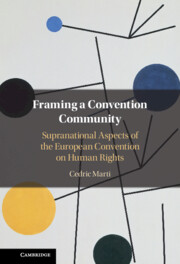Book contents
- Framing a Convention Community
- Framing a Convention Community
- Copyright page
- Dedication
- Contents
- Preface and Acknowledgments
- Table of Cases
- Table of International Instruments
- Abbreviations
- Introduction
- 1 Supranationality
- 2 Rediscovering Supranationality
- 3 From International toward Supranational Adjudication
- 4 Sites of Judicial Integration and Their Transformation
- 5 Supranational Lawmaking
- 6 From Supranational Adjudication to Supranational Law?
- Conclusion Framing a Convention Community
- Bibliography
- Index
6 - From Supranational Adjudication to Supranational Law?
Published online by Cambridge University Press: 12 November 2021
- Framing a Convention Community
- Framing a Convention Community
- Copyright page
- Dedication
- Contents
- Preface and Acknowledgments
- Table of Cases
- Table of International Instruments
- Abbreviations
- Introduction
- 1 Supranationality
- 2 Rediscovering Supranationality
- 3 From International toward Supranational Adjudication
- 4 Sites of Judicial Integration and Their Transformation
- 5 Supranational Lawmaking
- 6 From Supranational Adjudication to Supranational Law?
- Conclusion Framing a Convention Community
- Bibliography
- Index
Summary
This chapter tests the assumption that by virtue of the strong supranational adjudication and lawmaking by the Court, the ECHR could be considered supranational law in terms of its effect in domestic legal systems. The hypothesis of vertical integration is verified by adopting a two-fold approach analyzing both the perspective of the Court and the point of view of national legal orders. The first part of the chapter challenges the notion of implementation freedom. Taking a closer look at the Convention level reveals how the ECtHR developed a subtle yet sophisticated framework requiring domestic integration of the Convention’s substance and national courts to uphold and protect ECHR rights. The second part of the chapter looks at how domestic legal orders have received Convention law. Surveying existing studies demonstrates that Convention law may be considered de-facto supranational law, because it is, by and large, directly invocable by individuals vis-à-vis domestic authorities and effectively enforceable within national legal systems. Domestic resistance against the ECtHR, in its current form, must not necessarily be understood as an antithesis to integration, but can equally be regarded epiphenomenal.
Keywords
- Type
- Chapter
- Information
- Framing a Convention CommunitySupranational Aspects of the European Convention on Human Rights, pp. 163 - 197Publisher: Cambridge University PressPrint publication year: 2021

